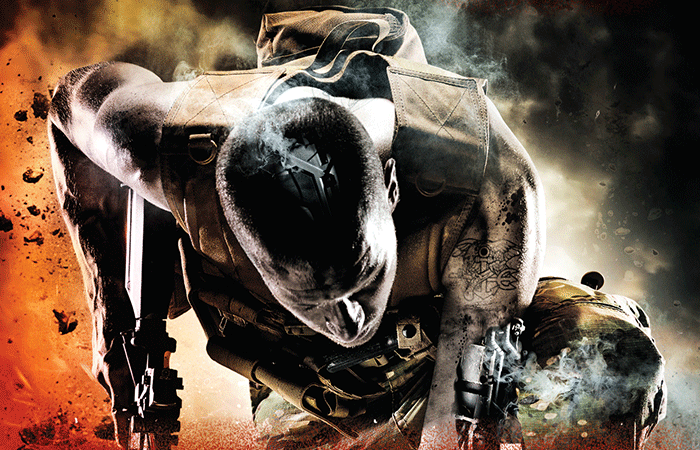
Myke Cole’s novels are fun as hell to read. Blending military action with epic fantasy, he’s depicted a world in which magic has emerged amongst the general population, and the various efforts to control it. In his latest, he tackles PTSD with his undead Navy SEAL, Jim Schweitzer.
We really dug Gemini Cell
http://www.amazon.com/Javelin-Rain-S...
Cole had a chance to chat with us about his latest novel, what he’s learned as an author, and incorporating PTSD into his narrative.
Javelin Rain is the latest in your Shadow Ops series, and takes place immediately after Gemini Cell. How does this story differ from the rest of the series?
The original Shadow Ops trilogy (Control Point, Fortress Frontier and Breach Zone) show the world after the Great Reawakening (the return of magic to the world), where magic is well known and accepted as a fact of life. The story of the original trilogy surrounds the bureaucracy specifically set up to deal with magic. One of it’s big “what if” questions (the kind that all good speculative fiction asks) is “What if magic was real? How would the government regulate it?” The answer is that it would cover it in red tape and make it boring as hell, and steamroll innocent people in the process, which helps create the conflict that dives the original trilogy.
Gemini Cell and Javelin Rain (and the concluding volume, Siege Line, which is coming in March of 2017) roll back the clock, examining magic at the very beginning of the Great Reawakening, when magic is first beginning to appear in the world. Magic is barely known and what little we do know about it is still kept under tight wraps, the province of the most secret organizations of our government. This secrecy is the polar opposite of legislated magic we see in the original trilogy. If I had to describe it by way of government agencies, the original trilogy is the Army, and this new trilogy is the CIA’s Special Activities Division.
The magic also differs in the two series. In the original trilogy, magic (at least in the United States) has been bureaucratized, fitted with a taxonomy that divides it into easily identifiable schools with firm boundaries. But with Alan Bookbinder’s powers in Fortress Frontier, I show that the taxonomy we’ve used isn’t up to handling something as wild and bright as magic. The prequel trilogy deals with a branch of magic that, by the time of Control Point, has been forbidden, lost or both (I’m not spoiling anything). It gives this latest round of books a very different, more occult flavor. When Dread Central did a piece on Gemini Cell, I was really surprised to find I was appealing to horror audiences who considered the book to be a zombie novel.
You’ve been changing things up a bit with each installment: Fortress Frontier was a bit of a quest novel, while you’ve described Gemini Cell as a romance. What theme does Javelin Rain predominantly take?
Javelin Rain is absolutely a PTSD novel. Jim Schweitzer’s death and reanimation is a bald-faced allegory for how going off to war changes a person in permanent ways (in this case, death and reanimation) that make it impossible to reconnect with the people they left behind. This isn’t to say that a new relationship with loved ones can’t be forged, it can, but only when it’s acknowledged as a NEW relationship, with different goals. Couples where one or both members have been to war have to relearn how to love one another, and that learning can often be a long, hard road. My fiance left me after I got back from Iraq. It was one of the most painful and instructive things I’ve ever experienced, and something I’ve really wanted a chance to explore in my fiction. Javelin Rain is, to a large degree, that chance.

What have you learned, five books into the series?
Not a damn thing. I’m not being facetious. I am continually shocked at how, whenever I sit down to write a book, it’s always like the first time I ever tried to write anything. It never gets easier, I never feel like I’ve learned how to do anything reliably. People *tell* me that I get better with each book, and I’m beyond delighted every time I hear it, but the truth is I don’t really believe it and it sure as hell doesn’t feel that way when I write. I think I’m wiser in terms of business expectations and how I go about marketing my work, all the peripheral stuff that has nothing to do with craft. But, when it comes to writing? I don’t know that I’ve learned anything at all.
What’s next for the series?
Siege Line is the third book under contract. As of the time of this interview, I’m 102,000 words (around 380 pages) into a first draft. I don’t want to spoil anything, but I will tell you that thus far much of the action unfolds on the shores of the Great Slave Lake in Canada’s remote Northwest Territory. It involves the Dene aboriginal people of Canada, Canada’s highly secret elite military unit Joint Task Force - 2 (JTF2), and CIA’s Special Activities Division (SAD). I love how Naomi Novik used her popular Temeraire series to explore how her conceit (the existence of dragons) played out all over the world. I’ve borrowed liberally from that idea, and thus far have given readers a glimpse of magic as it is practiced in France, the Middle East, China, Japan, the UK, Mexico and India, as well as the First Nations peoples in the United States. The sovereign territory of Quebec (yes, I went there) is alluded to in Breach Zone, but now I am taking the fight to Canada in earnest.
Javelin Rain is out in stores on March 29th.